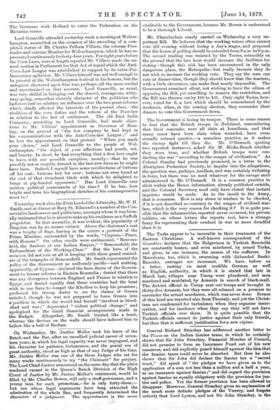Yesterday week also, the First Lord of the Admiralty, Mr.
W. H. Smith, met at dinner at Bury St. Edmund's a number of the Con- servative landowners and politicians, amongst whom it was form- ally intimated that he is about to take up his residence as a Suffolk proprietor. In that assembly, it was evident, the popularity of Jingoism was by no means extinct. Above the chairman's seat was a trophy of flags, having in the centre a portrait of the Prime Minister, surrounded by the words, "Cyprus,—Peace, with Honour." On other scrolls were emblazoned, "Beacons- field, the Saviour of our Indian Empire," "Beaconsfield, the Enfranchiser of the Working-Class." But the hero of the occasion did not roar at all in keeping with these grand remind- ers of the triumphs of Beaconsfield. Mr. Smith represented the policy of the Government as uniformly pacific—said nothing, apparently, of Cyprus—declared the keen desire of the Govern- ment to favour reforms in Eastern Roumelia ; denied that there was any divergence between England and France in relation to Egypt, and denied equally that these countries had the least wish to use force to compel the Khedive to keep his promises ; professed his strong desire to see the claims of Greece satisfied, though he was not prepared to force Greece into a position in which she would find herself "involved in blood- shed and war ;" deprecated "violent political change," and apologised for the timid financial arrangements made in the Budget. Altogether, Mr. Smith bleated like a lamb, whereas the devices on the walls should have induced him to bellow like a bull of Bashan.


































 Previous page
Previous page